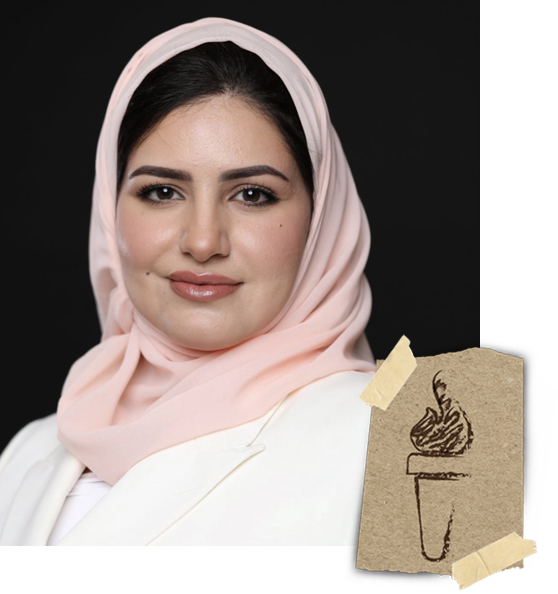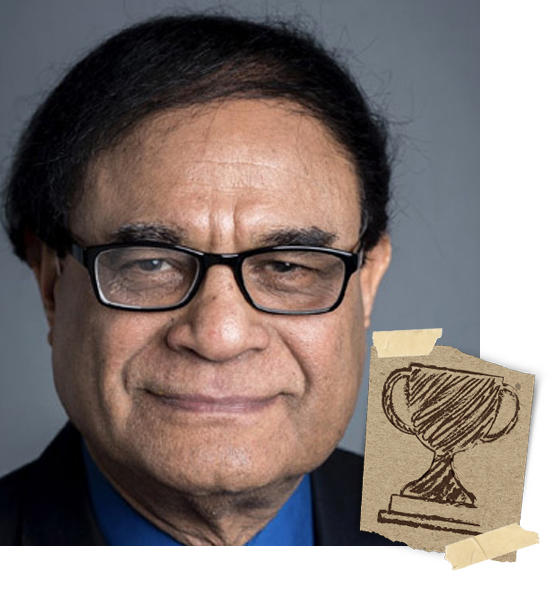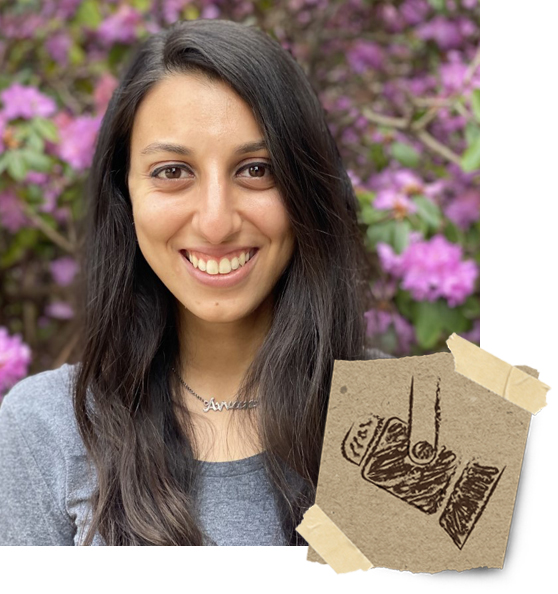Access Torch: Abeer Alanazi
April 11, 2025 - Emily Jodway
 Throughout the month of April, we recognize Arab American Heritage Month and the many contributions and achievements of Arab Americans in the past and present. Abeer Alanazi, a PhD student in the Department of Geography, Environment, and Spatial Sciences whose research focuses on renewable energy and environmental sustainability in Saudi Arabia and the United States, is our April Access Torch. Alanazi aspires to impart her knowledge to future students, contribute to positive changes in energy sovereignty and sustainability through her unique perspective as a geographer, and serve as a leader in promoting opportunities for empowerment for ambitious Saudi women.
Throughout the month of April, we recognize Arab American Heritage Month and the many contributions and achievements of Arab Americans in the past and present. Abeer Alanazi, a PhD student in the Department of Geography, Environment, and Spatial Sciences whose research focuses on renewable energy and environmental sustainability in Saudi Arabia and the United States, is our April Access Torch. Alanazi aspires to impart her knowledge to future students, contribute to positive changes in energy sovereignty and sustainability through her unique perspective as a geographer, and serve as a leader in promoting opportunities for empowerment for ambitious Saudi women.
Alanazi has spent much of her life in Saudi Arabia, Riyadh, earning her bachelor’s degree from Princess Nourah bint Abdulrahman University and her master’s degree from King Saud University, both located in the country’s capital city of Riyadh. She first became interested in the realm of geography in high school after taking a geography class with an instructor who inspired her to want to enter the field herself.
After graduating from her master’s program, Alanazi worked briefly in the private sector before she got higher education, and geography called to her again. She submitted her applications for university jobs, and King Soud accepted her for a teaching position. The job was conditional upon also being admitted into an American university; if accepted, she would receive a full scholarship and financial assistance to live and study in the United States and would return to Saudi Arabia after graduating to begin her job at King Saud.
In late 2017, Alanazi attended a conference that gathered together several prominent international universities and became acquainted with an associate dean and professor at the University of Florida. After learning more about the school, she submitted an application and was accepted, receiving her scholarship and job offer in addition. “This all happened within one month,” she said. “I felt my life flipped upside down. Things were changing so fast.”
Alanazi worked hard to apply and fulfill the requirements for international students, including a sufficient score on the International English Language Testing System (IELTS) required for non-native English speakers and a Graduate Record Examinations (GRE) score.
However, the journey was far from over. Alanazi attended Florida for one year and returned home over the summer to visit family. That was the summer of 2019, and Alanazi suddenly found herself unable to travel back to the United States due to COVID-19 restrictions. When she was able to come back, Florida broke the news to her: too much time would pass until the fall semester, and she would need to retake all of her exams. So she decided to transfer to Texas and eventually Michigan State after hearing about their geography program.
“I wanted to go to MSU because it’s a fantastic school, very high-ranked, one of the top 50 schools for geoscience,” she explained. “I passed my comprehensive exams. I’m currently working very hard on my proposal.”
Alanazi’s research focuses on improving and understanding renewable energy growth and how to promote environmental sustainability in Saudi Arabia. She has been utilizing comparison studies in one of her papers between the United States and Saudi Arabia to learn from what policies have been put in place here, what has worked, what hasn’t, and what some of the greatest challenges are. She hopes to take these lessons in renewable energy and energy production and implement them in her home country to increase energy sovereignty and the usage of renewable resources, while hopefully decreasing Saudi Arabia’s reliance on oil production.
“Our country is investing billions into renewable energy and has designed Vision 2030, which is a plan to build a more prosperous country with ambitious plans for eco-friendly environmental systems and green initiatives,” Alanazi said. “But we want to see notable progress on the ground. We continue to rely on oil to generate electricity. We are behind in this field.”
Alanazi hopes that her unique skill set as a geographer can bring a fresh perspective into the equation. “People underestimate geography,” she explained. “They think it’s just about maps and directions. However, it encompasses much more than just that! Digital technology is used daily for navigation and global exploration. There is an abundance of programming, applications, and highly advanced science available. I aspire to utilize this science and collaborate with others to explore the development of energy sovereignty in my community.”
At Michigan State, Alanazi has continued to develop her geopolitical knowledge and the utilization of various different systems to enhance environmental knowledge. She has created digital maps, used Geographic Information Systems to map an area’s ecosystem and pollution output, and learned Python and R to assist in data analysis.
“Saudi invests in brains; human capital is the most important. I want to see my country as a leader in renewable energy, just as it is in oil. I want to understand how massive investments in this domain could change and alter the energy dependency in our society,” she said. “It’s important to decide which type of energy we use for our households. However, the available options are neither flexible nor robust. I know many studies are happening to address these challenges, but not from my geographical perspective.”
Alanazi hopes to bring her knowledge back home and educate her future students at King Saud to increase societal awareness, influence policy for quality life and wellbeing, and encourage more people to become active in changing their society for the better, taking responsibility for the care of our planet into our hands.
“I think it’s generous of our government to invest in us. The recent openness in the country encourages us, particularly in terms of women's empowerment. I feel like we have a future there; the opportunities are growing, so we have to be ready.”
Despite her eagerness to return home, Alanazi is grateful for her time in the US and the hospitality that has been shown to her here in the States, particularly while at Michigan State. She is a member of the Saudi Student Organization and Supporting Women in Geography (SWIG). She has made close friends here that feel like family and has cultivated a home away from home while being supported by her colleagues, faculty mentors, and friends in the U.S.
Alanazi observes a strong reflection of these sentiments in the Arab American communities throughout the state. “I am glad that the support and relationship between Saudi Arabia and America is historically exceptional,” she said. She admires the ability of Arab American citizens, often with their own Islamic centers and Arabic schools in their neighborhoods, to also flourish among the community at large. She sees the impact of Arab American culture and heritage all around her, especially in Michigan State.
“Exploring Michigan reveals the popularity of the Arab majority, particularly in the suburbs of Detroit. We can observe the influence of Arab culture, food, customs, and other elements. For instance, the population of Dearborn was created in part by the Yemeni workers that came here to work for the Ford company, and this generation has built up a specific culture,” she said. “I feel that Arabs here, this is their home. I also observe that many of them are highly educated, both as individuals and as workers. They go back to the Middle East to visit, but they feel more comfortable here. This place is their true home.”
Honorees’ views are their own and do not necessarily reflect those of the College of Social Science.
Read more:

Access Champion
Faculty/Staff
Dr. Fayyaz Hussain
Our Access Champion this month is Dr. Fayyaz Hussain, a professor of Integrative Studies in Social Science who has been teaching at Michigan State for over 30 years.

Access Spotlight
Alumni
Avvan Sanjana
Our April Access Spotlight is on Avvan Sanjana, a licensed therapist who supports students through her work at the MSU Center for Survivors.

Access Matters
We strive to cultivate an inclusive and welcoming college environment that celebrates a diversity of people, ideas, and perspectives.

